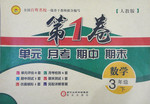题目内容
Being a capable woman,Nancy _____ to be considered as merely a housewife.
A.agrees B.admits
C.refuses D.rejects
C

练习册系列答案
 第1卷单元月考期中期末系列答案
第1卷单元月考期中期末系列答案
相关题目
题目内容
Being a capable woman,Nancy _____ to be considered as merely a housewife.
A.agrees B.admits
C.refuses D.rejects
C

 第1卷单元月考期中期末系列答案
第1卷单元月考期中期末系列答案